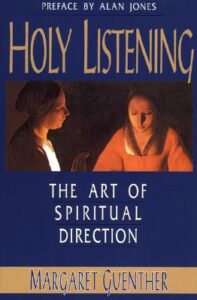 Summary: A modern classic about spiritual direction.
Summary: A modern classic about spiritual direction.
It would not be surprising to anyone who regularly reads my book reviews that I generally have a book in three broad areas going at almost all times: Spiritual direction/spiritual formation, history, and biography/memoir. I try not to have more than one of each category going at a time, but those three categories are about shaping the way I am in the world. I want to pay attention to my spiritual formation. I want to equip myself as a spiritual director. I want to understand how the world was shaped to be as it is now so I can think more clearly about the way forward. And I want to see how others have lived as a means to see how I can live well.
Holy Listening is a book I have had on my shelf for a while, but I have not read it. It is a modern classic on spiritual direction. First published in the early 1990s, when spiritual direction was starting to have a broader resurgence, Guenther wrote particularly as a female pastor and spiritual director in a way that was probably more radical than it feels now. There are many metaphors for spiritual direction that authors have used over time, but Guenther embraces the metaphor of spiritual directors as midwives. That is a particularly feminine metaphor. I think both men and women spiritual directors need various metaphors because any one metaphor breaks down when pressed too far. Guenther is aware that she is oriented toward a feminine metaphor and does defend it a bit, but essentially allows it to stand on its own.
Dr. Rudine Sims Bishop wrote a well-known essay in 1990 about exposing children to diverse books because books can be “windows, mirrors, and sliding glass doors.” (The link is to a 2-minute video of Bishop describing her language.) Students can see themselves (mirror), they can see how others live in ways that they do not (windows), and they can immerse themselves in the experience of others (sliding glass doors). An important part of the essay is that Bishop argues that diverse books are important to white students who (even 30 years after the essay) mostly see themselves (mirrors) in the books that surround them. And that can create a distorting effect on those students, impacting the way that they see the world as normative for them.
The book ends with a more explicit discussion about women as spiritual directors and the need for the church to embrace women as spiritual directors and directees in part because women have been marginalized in church leadership, even as they often are the backbone of the church. I do not know if there are statistics about women and spiritual direction, but my anecdotal experience is that women are both more likely to seek spiritual formation experiences, they buy and read more books, they are more likely to attend church, they are more likely to serve, they are more likely to make up the larger percentage of spiritual direction programs. But most books are written by men with the assumption that men are the primary readers.
It is reasonably well known that men tend not to read women. Kaitlyn Schess, in her latest Getting Schooled video, speaks about the publishing reality that women authors tend to sell more books if they are marketed just to women. Women tend to read more, but when men read, they overwhelmingly read male authors (90% by one study). Women authors have overwhelmingly female audiences (about 80%). However, male authors still have a roughly even gender divide among their readers. Publishing has some responsibility here, but it seems that while women often read men, men do not read women at the same rates, even if both genders tend to read books by their same gender at higher rates.
This has mostly not been about the book itself. Still, as I read the book, I kept thinking about how the book seems to be consciously trying to speak to the reader to encourage both men and women to think differently about spiritual direction to expand what spiritual direction can be. The focus is to encourage people’s spiritual lives. If we alienate women from spiritual formation or bias their understanding of spiritual formation in only gendered ways, we end up harming both men and women.
I have said it before, but we need to talk much more about becoming mature Christians and much less about becoming mature men or women. The point should be about maturity, and when we gender maturity, we harm not only the ideas of what maturity is but those that do not conform to stereotypical norms. I believe that part of why we currently embrace misogynistic Christian ideas among a too large group of Christians is because there has been a mistaken understanding of the pragmatic means of reaching men. (This is a gender impact of the Homogeneous Unit Principle.) Instead of addressing the problems of men only listening to men, many have doubled down and made it a theological requirement to become a toxic male to be a mature Christian man. And that, I think, is part of why women are leaving the church at more significant rates than men.
Holy Listening: The Art of Spiritual Direction by Margaret Guenther Purchase Links: Paperback, Kindle Edition, Audible.com Audiobook